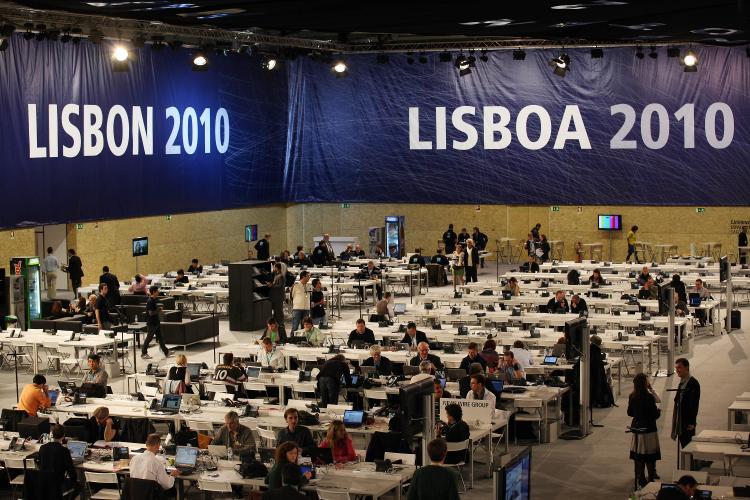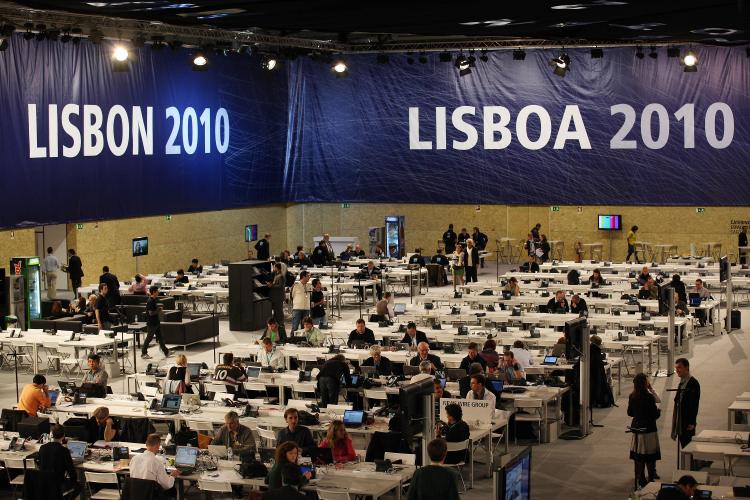NATO’s deadline to pass control of security in Afghanistan over to the Afghan people by 2014 will be one of the main topics at the NATO Summit in Lisbon from Nov. 19 to 20.
Support for the war in Afghanistan has fallen among many NATO countries. Nailing down a commitment from each to maintain operations beyond 2011 will be a key U.S. focus.
In some extreme cases like the Netherlands, the unpopularity of the war caused the government to fall, and the troops were pulled out not long after.
As things stand, however, most of the major players appear to be in for the long haul. Canada was among the first to reaffirm its support, stating on Nov. 16.
Although it will largely cease combat operations past the July 2011 drawdown, it will keep 750 trainers and 200 support troops in the country.
This was a major switch from Canada’s former plan to withdraw all troops after July 2011, when the United States is scheduled to begin a gradual troop reduction in Afghanistan.
“That’s a big deal for the U.S. The Canadians were going to withdraw entirely. The fact that they’re doing that is perceived as a great thing by U.S. policymakers,” said Caroline Wadhams, director for South Asia Security Studies at the Center for American Progress.
More than 47 countries maintain a presence in Afghanistan, with the main countries involved in combat operations being the United States, the U.K., Canada, France, Denmark, Romania, and Australia. “The bottom line is that the U.S. is reliant on NATO and needs NATO’s help,” Wadhams said.
Still, the general opinion of the war in each country cannot be overlooked. “It’s unpopular in basically every country that’s contributing. It’s deeply unpopular with the [Canadian] Parliament and with the public,” Wadhams said.
Over the past week, Secretary of State Hillary Clinton has been holding talks with foreign representatives, and the Afghan strategy has been among the main topics while addressing the press.
Clinton stated that the “Lisbon summit will be a demonstration of unity and affirmation of the strategy that we are pursuing,” according to a transcript of her remarks following a meeting with U.K. Foreign Secretary William Hague.
She added that the U.S. goal is the same as that set by Afghan President Hamid Karzai during his inaugural address, which “is to have full transition to Afghan security by 2014.”
U.K. Foreign Secretary William Hague added his support, saying he is “in complete accord with that,” and “Four years is quite a long time.”
Clinton made similar remarks on Nov. 15, following a meeting with Lithuanian Foreign Minister Audronius Azubalis, yet added “The pace of transition of security and responsibility obviously depends on the ability of the Afghan national security forces and the Afghan National Police Force to be able to take charge.”
Although the 2014 transition has been openly discussed, the official announcement will take place during the NATO Summit in Lisbon, according to the Department of State’s America.gov website.
“What they’re trying to do is provide a NATO timeline to maintain support of NATO countries—basically assuring them that this is not endless,” said Wadhams.
She added: “There is a huge interest in trying to help the United States. I think a lot of NATO countries are trying to contribute because they’re doing it for their relationship with the United States. It sometimes has more to do with that than it has to do with Afghanistan.”
Continued, see Situation on the Ground on the next page...
Despite NATO’s overall stance, there are a few wildcards in the mix.
While it may be good news to European voters who oppose the war, cuts being made to the defense budgets of many NATO countries—particularly in Germany, France, and Britain—could cause problems, according to a Council on Foreign Relations interview with Robert E. Hunter, U.S. ambassador to NATO from 1993 to 1998, and RAND Corporation senior adviser.
The budget cuts, according to Hunter, were not apparently coordinated. “What I would like to see is a process where all the allies, including the United States, work together to limit the extent to which budget cuts also cut into NATO capabilities,” he said.
“[NATO] also needs to get serious about the so-called Comprehensive Approach, the integration of nonmilitary efforts like governance, reconstruction, and development, as in Afghanistan,” Hunter said. “This means breaking down the remaining barriers between NATO and the EU, which I don’t expect to happen at Lisbon.”
A key concern is that if NATO and coalition forces pull out too soon, it will eliminate a buffer between various insurgent groups including the Taliban, and the Afghan government—creating a risk of civil war.
The Taliban is targeting Afghan government officials for assassination. The Afghan army and police force, on the other hand, are being specifically trained to fight the Taliban, and many have participated in military operations to do just that.
Partly due to this factor, even the 2014 deadline for passing security of the country over to Afghan security forces is iffy, since it will depend on whether they are up for the challenge.
Caroline Wadhams said that military operations against the Taliban, particularly raids to capture or kill mid-level Taliban leaders, have created a unique d ynamic in the country that could affect the progress of the counterinsurgency, or COIN, strategy.
“That may be leading to radicalization of the movement because they’re killing a lot of people there, and the insurgency is replacing them—but with younger and younger, more radicalized people,” Wadhams said.
The concern this raises, according to Wadhams, is that this will affect potential negotiations with the Taliban, because as the mid-level leaders are being killed or captured, their more radical replacements may not be interested in negotiations.
Meanwhile, although operations have placed tremendous pressure on the Taliban, it has had residual impact on the communities where the operations take place.
“The problem is that they’re basically trying to clear places and reverse the momentum, but they don’t have a government that has sufficient support to then take over,” Wadhams said.
If NATO moves into an area yet doesn’t hold it, it will fall back to Taliban control. Civilians in such areas are faced with a challenge where they are afraid to take sides, since if they align themselves with NATO, they risk being killed by the Taliban.
“You need to be able to hand it over to the Afghan government, or it’s probably going to just fall back into the hands of the Taliban again,” Wadhams said. “So you end up creating a dynamic where you put communities through tremendous amounts of violence for unsustainable security gates.”
There is also the Pakistan factor, particularly related to the insurgent groups that have a safe haven there. Although the Pakistani government does go after insurgent groups in the country who pose a threat against Pakistan, there are others that are largely on the country’s safe list—such as the Haqqani network—as their targets lie elsewhere.
“I don’t think Pakistan’s going to go after them. These factions are proxies for them. They are groups they believe will protect Pakistani interests against a potential rise in India,” Wadhams said.
The Pakistani government is uncertain about the future of the region: from the influence India will have over the Afghan government, to Karzai’s stance on Pakistan, to changes in NATO operations.
“There’s just so much uncertainty that they feel they need to hold onto this card they have, and deploy it when they need it. I do not think that’s going to change,” Wadhams said.
Support for the war in Afghanistan has fallen among many NATO countries. Nailing down a commitment from each to maintain operations beyond 2011 will be a key U.S. focus.
In some extreme cases like the Netherlands, the unpopularity of the war caused the government to fall, and the troops were pulled out not long after.
As things stand, however, most of the major players appear to be in for the long haul. Canada was among the first to reaffirm its support, stating on Nov. 16.
Although it will largely cease combat operations past the July 2011 drawdown, it will keep 750 trainers and 200 support troops in the country.
This was a major switch from Canada’s former plan to withdraw all troops after July 2011, when the United States is scheduled to begin a gradual troop reduction in Afghanistan.
“That’s a big deal for the U.S. The Canadians were going to withdraw entirely. The fact that they’re doing that is perceived as a great thing by U.S. policymakers,” said Caroline Wadhams, director for South Asia Security Studies at the Center for American Progress.
More than 47 countries maintain a presence in Afghanistan, with the main countries involved in combat operations being the United States, the U.K., Canada, France, Denmark, Romania, and Australia. “The bottom line is that the U.S. is reliant on NATO and needs NATO’s help,” Wadhams said.
Still, the general opinion of the war in each country cannot be overlooked. “It’s unpopular in basically every country that’s contributing. It’s deeply unpopular with the [Canadian] Parliament and with the public,” Wadhams said.
Over the past week, Secretary of State Hillary Clinton has been holding talks with foreign representatives, and the Afghan strategy has been among the main topics while addressing the press.
Clinton stated that the “Lisbon summit will be a demonstration of unity and affirmation of the strategy that we are pursuing,” according to a transcript of her remarks following a meeting with U.K. Foreign Secretary William Hague.
She added that the U.S. goal is the same as that set by Afghan President Hamid Karzai during his inaugural address, which “is to have full transition to Afghan security by 2014.”
U.K. Foreign Secretary William Hague added his support, saying he is “in complete accord with that,” and “Four years is quite a long time.”
Clinton made similar remarks on Nov. 15, following a meeting with Lithuanian Foreign Minister Audronius Azubalis, yet added “The pace of transition of security and responsibility obviously depends on the ability of the Afghan national security forces and the Afghan National Police Force to be able to take charge.”
Although the 2014 transition has been openly discussed, the official announcement will take place during the NATO Summit in Lisbon, according to the Department of State’s America.gov website.
“What they’re trying to do is provide a NATO timeline to maintain support of NATO countries—basically assuring them that this is not endless,” said Wadhams.
She added: “There is a huge interest in trying to help the United States. I think a lot of NATO countries are trying to contribute because they’re doing it for their relationship with the United States. It sometimes has more to do with that than it has to do with Afghanistan.”
Continued, see Situation on the Ground on the next page...
Situation on the Ground
Despite NATO’s overall stance, there are a few wildcards in the mix.
While it may be good news to European voters who oppose the war, cuts being made to the defense budgets of many NATO countries—particularly in Germany, France, and Britain—could cause problems, according to a Council on Foreign Relations interview with Robert E. Hunter, U.S. ambassador to NATO from 1993 to 1998, and RAND Corporation senior adviser.
The budget cuts, according to Hunter, were not apparently coordinated. “What I would like to see is a process where all the allies, including the United States, work together to limit the extent to which budget cuts also cut into NATO capabilities,” he said.
“[NATO] also needs to get serious about the so-called Comprehensive Approach, the integration of nonmilitary efforts like governance, reconstruction, and development, as in Afghanistan,” Hunter said. “This means breaking down the remaining barriers between NATO and the EU, which I don’t expect to happen at Lisbon.”
A key concern is that if NATO and coalition forces pull out too soon, it will eliminate a buffer between various insurgent groups including the Taliban, and the Afghan government—creating a risk of civil war.
The Taliban is targeting Afghan government officials for assassination. The Afghan army and police force, on the other hand, are being specifically trained to fight the Taliban, and many have participated in military operations to do just that.
Partly due to this factor, even the 2014 deadline for passing security of the country over to Afghan security forces is iffy, since it will depend on whether they are up for the challenge.
Counterinsurgency
Caroline Wadhams said that military operations against the Taliban, particularly raids to capture or kill mid-level Taliban leaders, have created a unique d ynamic in the country that could affect the progress of the counterinsurgency, or COIN, strategy.
“That may be leading to radicalization of the movement because they’re killing a lot of people there, and the insurgency is replacing them—but with younger and younger, more radicalized people,” Wadhams said.
The concern this raises, according to Wadhams, is that this will affect potential negotiations with the Taliban, because as the mid-level leaders are being killed or captured, their more radical replacements may not be interested in negotiations.
Meanwhile, although operations have placed tremendous pressure on the Taliban, it has had residual impact on the communities where the operations take place.
“The problem is that they’re basically trying to clear places and reverse the momentum, but they don’t have a government that has sufficient support to then take over,” Wadhams said.
If NATO moves into an area yet doesn’t hold it, it will fall back to Taliban control. Civilians in such areas are faced with a challenge where they are afraid to take sides, since if they align themselves with NATO, they risk being killed by the Taliban.
“You need to be able to hand it over to the Afghan government, or it’s probably going to just fall back into the hands of the Taliban again,” Wadhams said. “So you end up creating a dynamic where you put communities through tremendous amounts of violence for unsustainable security gates.”
Pakistan Factor
There is also the Pakistan factor, particularly related to the insurgent groups that have a safe haven there. Although the Pakistani government does go after insurgent groups in the country who pose a threat against Pakistan, there are others that are largely on the country’s safe list—such as the Haqqani network—as their targets lie elsewhere.
“I don’t think Pakistan’s going to go after them. These factions are proxies for them. They are groups they believe will protect Pakistani interests against a potential rise in India,” Wadhams said.
The Pakistani government is uncertain about the future of the region: from the influence India will have over the Afghan government, to Karzai’s stance on Pakistan, to changes in NATO operations.
“There’s just so much uncertainty that they feel they need to hold onto this card they have, and deploy it when they need it. I do not think that’s going to change,” Wadhams said.







